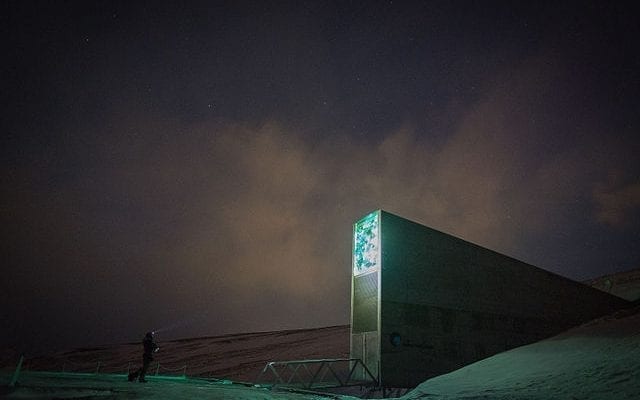
News
Looking Inside The Doomsday Vault
Located in one of the most remote icy mountain areas between Norway and the North Pole, there lies one of the most important vaults in all of the world. Rather than money or valuables, this vault contains the world’s largest collection of seeds, representing the exponential agricultural biodiversity found around the world. This global seed vault has been called the “Doomsday Vault” as it will be the guiding hope for restoring agricultural biodiversity if the world were to experience a global catastrophe or apocalyptic event. While that name may sound ominous, the official name of the facility is the Svalbard Global Seed Vault.
 The seed vault is owned and administered by the Ministry of Agriculture and Food in Norway, with it established as being a service to the global community. Located in Svalbard, this setting was chosen for the extremely cold climate and permafrost around the location, making it perfect for underground cold storage. The vault that stores the seeds is located an astounding 393 feet within the rock of the mountain, ensuring that the freezing temperatures will remain even in the event of a failure to the cooling systems or change in temperature due to climate change.
The seed vault is owned and administered by the Ministry of Agriculture and Food in Norway, with it established as being a service to the global community. Located in Svalbard, this setting was chosen for the extremely cold climate and permafrost around the location, making it perfect for underground cold storage. The vault that stores the seeds is located an astounding 393 feet within the rock of the mountain, ensuring that the freezing temperatures will remain even in the event of a failure to the cooling systems or change in temperature due to climate change.
This vault was created to be the most secure seed bank in the world, housing millions of different seed samples that are paramount the maintaining food security for many nations. This is especially true for developing countries, who have seen their own seed banks destroyed by war. By maintaining a high level of crop diversity, plant breeders are able to develop varieties of crop that are resistant to diseases, pests, and changing climates. In the event of a catastrophe, the vault will hold copies of these seeds in order to once again begin agricultural food production.
In 2015, researchers withdrew seeds for the first time since the construction of the vault. They were used to create new seed banks in Morocco and Lebanon, after the regions central seed bank was destroyed due to the civil war in Syria. Currently, any nation that deposits seeds may withdraw them if needed, but so far, this has been the only case. The vault does not allow for the deposit of genetically modified seeds, as per Norwegian Law.
While the vault is known for being the absolute best in protecting the global seed supply, the facility sprung a leak last year, after construction crews failed to plan for the event of the surrounding permafrost melting. Due to rising global temperatures, the vault will now require extensive upgrades to maintain its level of security. Norway recently announced they will be spending close to $13 million in upgrades to the vault. The upgrades will go towards reinforcing the structure to protect against future leaks, as well as including a new building that will house emergency power and refrigeration units.
The vault is an important global measure that exhibits rare cooperation, in a time of tense political atmosphere and uncertainty among nations. The vault does not base off political standpoints, but rather by the good of humankind. Brian Lainoff, lead partnership coordinator of the trust that manages the vault, says “The seeds don’t care that there are North Korean seeds and South Korean seeds in the same side, they are cold and safe up there, and that’s all that really matters.”


0 comments